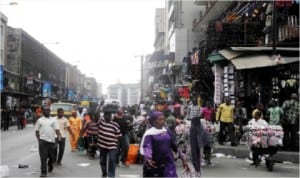Business
China’s Auto Fair Drives Oil Demand
Every two seconds, somewhere across China a customer takes delivery of a new car, part of a consumer buying blitz that will see China add 21 million new cars, trucks and buses to its fleet total in 2014.
Short of a catastrophic economic downturn, a government edict against new car ownership, or draconian traffic congestion charges, a continuation of that growth rate means China will likely have a bigger motor vehicle fleet than the United States by 2020, the CNN reports.
Indeed, the combination of a low vehicle penetration rate, only 85 vehicles for every 1,000 people in China, compared with more than 800 per 1,000 in the US, and the consumer aspirations of high-income, urbanised households across China almost guarantees it.
As many as five million of the 260 million-plus vehicles on Chinese roads in 2020 will be plug-in hybrids or battery electric vehicles, while others will use fuel cells. Many of the country’s taxis, trucks and buses will run on compressed natural gas. There will be multiple fuel-saving aids and financial incentives.
But overwhelmingly, passenger cars will still run on gasoline and diesel fuel, which is why Chinese demand for petroleum is the key factor in the global energy outlook for 2014 and beyond.
China is already the world’s biggest energy consumer and must import 60% of the crude oil it needs to meet its transport and refinery needs, as well as to fire some of its industries and power plants. Much of the estimated 10.5 to 11 million barrels of oil that China consumes every day comes from Saudi Arabia and other Middle Eastern suppliers, and many of the Middle Eastern crude carriers must pass through the Strait of Malacca “choke point” between Malaysia and Indonesia en route to China.
Even though major Chinese cities such as Beijing, Shanghai and Guangzhou have begun to introduce vehicle-use restrictions to combat traffic congestion and pollution, analysts expect the consumer action will simply move to other less-crowded venues.
Already, leading global carmakers like VW, GM, Hyundai, Toyota and their Chinese joint venture partners are targeting second, third and fourth-tier cities where the car ownership growth opportunities may be greatest.
In a study last year, management firm McKinsey said that apart from government restrictions and a growing used-car market, other factors that could impact on China’s new car sales over the next decade include industry consolidation, improved public transport options and the growth of car-sharing and car rental businesses. At the same time, McKinsey said more Chinese buyers were looking for bigger, better and more expensive vehicles such as sports utility vehicles.
That will ensure China becomes the biggest player in the global energy-for-transport sector. It will also be the world’s biggest user of electric vehicles and a potential pioneer of fuel cells.
In contrast to the Chinese experience, car and light truck fuel use is declining sharply in the U.S. A combination of fuel efficiency and changes to driving behavior means there will likely be a 25% drop in light-duty vehicle energy consumption between now and 2040, the EIA said in its 2014 annual energy outlook released on December 16.
Business
Agency Gives Insight Into Its Inspection, Monitoring Operations

Business
BVN Enrolments Rise 6% To 67.8m In 2025 — NIBSS

The Nigeria Inter-Bank Settlement System (NIBSS) has said that Bank Verification Number (BVN) enrolments rose by 6.8 per cent year-on-year to 67.8 million as at December 2025, up from 63.5 million recorded in the corresponding period of 2024.
In a statement published on its website, NIBSS attributed the growth to stronger policy enforcement by the Central Bank of Nigeria (CBN) and the expansion of diaspora enrolment initiatives.
NIBSS noted that the expansion reinforces the BVN system’s central role in Nigeria’s financial inclusion drive and digital identity framework.
Another major driver, the statement said, was the rollout of the Non-Resident Bank Verification Number (NRBVN) initiative, which allows Nigerians in the diaspora to obtain a BVN remotely without physical presence in the country.
A five-year analysis by NIBSS showed consistent growth in BVN enrolments, rising from 51.9 million in 2021 to 56.0 million in 2022, 60.1 million in 2023, 63.5 million in 2024 and 67.8 million by December 2025. The steady increase reflects stronger compliance with biometric identity requirements and improved coverage of the national banking identity system.
However, NIBSS noted that BVN enrolments still lag the total number of active bank accounts, which exceeded 320 million as of March 2025.
The gap, it explained, is largely due to multiple bank accounts linked to single BVNs, as well as customers yet to complete enrolment, despite the progress recorded.
Business
AFAN Unveils Plans To Boost Food Production In 2026
-

 Sports4 days ago
Sports4 days agoTinubu Lauds Super Eagles’ after AFCON bronze triumph
-

 Sports4 days ago
Sports4 days agoAFCON: Lookman gives Nigeria third place
-

 Sports4 days ago
Sports4 days agoFulham Manager Eager To Receive Iwobi, Others
-

 Sports4 days ago
Sports4 days ago“Mikel’s Influence Prevent Some Players Invitation To S’Eagles Camp”
-

 Sports4 days ago
Sports4 days agoMan of The Match award Excites Nwabali
-

 Sports4 days ago
Sports4 days agoRemo, Ikorodu set for NPFL hearing, Today
-

 Sports4 days ago
Sports4 days agoPolice Games: LOC inspects facilities in Asaba
-

 Niger Delta4 days ago
Niger Delta4 days agoINC Polls: Ogoriba Pledges To Continuously Stand For N’Delta Rights … Picks Presidential Form


